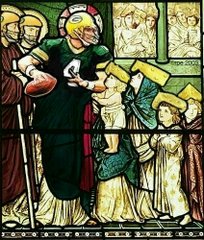
To hear the sermon for Ash Wednesday preached at Trinity Luthran Church of Layton, Utah, "The Fasting of Repentance," click on this mp3 audio link.
The audio includes the Hymn of the Day, "From Dust We Were Made," following the sermon. This is a hymn written for Ash Wednesday, 2012, by Rev. Eric Stefanski, Holy Trinity Evangelical-Lutheran Church, UAC, Harrison. AR; v. 7 by Rev. Kurt Hering, Trinity Lutheran Church, Layton, UT. I am including the text for this hymn following the preaching transcript below for those who prefer to read along, or read instead.
TEXT: [Jesus said:] “Beware of practicing your righteousness before other people in order to be seen by them, for then you will have no reward from your Father who is in heaven.
thieves break in and steal, 20but lay up for yourselves treasures in heaven, where neither moth nor rust destroys and where thieves do not break in and steal. 21For where your treasure is, there your heart will be also.” Matthew 6:1–6, 16–21
Dear people of God,
We notice a couple of things in our Gospel lesson for Ash Wednesday. First of all, we notice that our Lord says, “When you fast”--not “if you fast,” but “when you fast.” This reminds us that we people of God’s Church have a tendency to throw the baby out with the bath water. Like with so many things in so many Christian churches, out of an overreaction against the abuses that have been perpetrated in Christ’s churches throughout the ages—making them into works of men to be boasted of —we have thrown out fasting to a large degree: along with the liturgy in many places, and with private confession and absolution--that wonderful opportunity to confess sins to a pastor as to Christ Himself, those sins that you think maybe, just maybe, nobody else has ever done in their lives. And how could God forgive even that. That sin, that is that one to bring before the pastor to hear, yes, that one too is forgiven.
Throwing these good things that Christ has given us and even commanded us to do--like fastin-- is like throwing the baby out with the bath water.
In our Gospel lesson today we see Jesus speak of things like doing good works, that is, practicing your righteousness. Certainly it’s not that we ought not be righteous and do good works. It’s just that we do not boast of them to other people, or think of them as something that earns us
anything before God in heaven.
Giving to the needy, of course, is something that we do—giving alms to the poor, supporting those who are doing without. That is one of those good works given to us to do [Ephesians 2:10]. And we do it with joy, but without boasting of those things--not pointing to them as reasons for us to be saved, but just things that Christ’s people, His baptized children do because He has been so gracious to them.
And praying! Of course we pray. And of course we pray--even together as the Church. Shortly after this passage Jesus institutes, hands over, speaks the Lord’s Prayer to His disciples. And the very first words tell us that we pray them as a church and we pray them together. “Our Father,
who art in heaven…. Our Father—we pray them together. But not in order to be seen by people so they will see how pious we are. But that we pray together as one, as Christ’s holy bride coming before Him, beseeching Him of His mercies and asking for our daily bread in this world and the next—food for our flesh and that forgiveness of sins for our soul.
For the baptized children of God these just are things that we do, whether we even know it or not, as Christ says to those sheep on His right hand on the Last Day who ask, “When, when did we do these things?”
But these are the things that we do. And fasting is one of those things. It doesn’t mean that you go without any kind of food. It may not even be food that you fast from at all. But this fasting, of which our Lord speaks, that the Christian does, is a fasting of repentance—a fasting of relying
on nothing of this world and seeking nothing but His Word first, knowing that all these other things will be added to us [Matthew 6:33].
As Luther writes [in our READING FROM THE BOOK OF CONCORD for ASH WEDNESDAY from the LARGE CATECHISM on the SACRAMENT OF THE ALTAR
. . . 37 Fasting, prayer, and other such things may indeed be outward preparations and discipline for children, so that the body may keep and bring itself modestly and reverently to receive Christ’s body and blood. Yet the body cannot seize and make its own what is given in and with the Sacrament. This is done by the faith in the heart, which discerns this treasure and desires
it. . . .
And as a side note to that, the Sacrament is always available in Christ’s Church. In our Confessions we say, the priests stand willing, the pastors stand ready, and willing, and able to give the Sacrament to any who come and request it—and that is whenever they feel they are in need of it. [Augsburg XXIV.34-47]
And so we are back to this fasting of repentance. For those who come to the table, come empty--requesting that Bread of Life that fills their soul and even gives them the very body and blood of Christ to keep them strong in body and soul, keeping them in Christ and Christ in them unto
eternal life.
The imposition of ashes as we practice it is a part of the Fast of Repentance in our worship life. We do not do it to go out and show how Christian and how pious we are. In fact, before you leave today you may want to wash it off of your head. But if you do go out, you go out as a witness to
Christ, who took your sin upon Him—who took the sins of even the whole world upon Him. And so, though you may be reticent to speak of your faith, if somebody asks you what that cross is, you can tell them and not speak of your own piety and righteousness but of your gracious Christ!—your Savior.
And so, this fasting--including this imposition of ashes--is not a work of righteousness to be witnessed by men, but a penitential reverence for the Word of God as the one thing that is needful for us [Luke 10:42]--to come forward, to receive the very Bread of Life, the forgiveness of
sins.
Yes, true fasting is a matter of preparing and presenting ourselves to the Lord as empty vessels ready to receive His body and blood for the forgiveness of our sins--in the name of the Father, and of the + Son, and of the Holy Spirit.
From Dust We Were Made
by Rev. Eric Stefanski, Holy Trinity Evangelical-Lutheran Church, UAC, Harrison,
AR; ; v. 7 by Rev. Kurt Hering, Trinity Lutheran Church, Layton, UT
1. From dust we were made;
To dust we shall go:
The end of our flesh
Is fitting to know,
So that we may hallow
Our God’s holy name,
Who to save us sinners
In human flesh came.
2. Now lowly we kneel
In penitence true,
As our whole burden
Is placed, Lord, on You.
You willingly take it
Our Savior to be,
E’er righteously walking
Unto Calvary.
3. For dust, Lord, You give
A life that endures;
Your taking our flesh
Revived flesh secures.
Our whole selves are holy
In God’s eyes by grace,
Alone through Your merit,
Your death in our place.
4. Thus You
have washed us
With water and Word:
That we should receive
You as our dear Lord,
Who, alone redeemed us,
And made us to live
The righteousness You made,
The Spirit us gives.
5. Oh, grant us to see
Through these forty days
The depth of our debt
For which Your blood pays,
That rightly we trust You
Who saves us from sin,
Who gave up Your own life
Our lives all to win.
6. So let us hail You,
That on the Last Day
In glorified flesh
We sing to Your praise:
“How worthy the Lamb is
Who for us was slain!”
Forevermore blessing
Your life-giving name.
7. For on that great day
Our dust shall arise;
Along with all saints
To see with our eyes:
The Son, who with Father
And Spirit is Lord,
Forever in flesh by
His baptized adored.






No comments:
Post a Comment